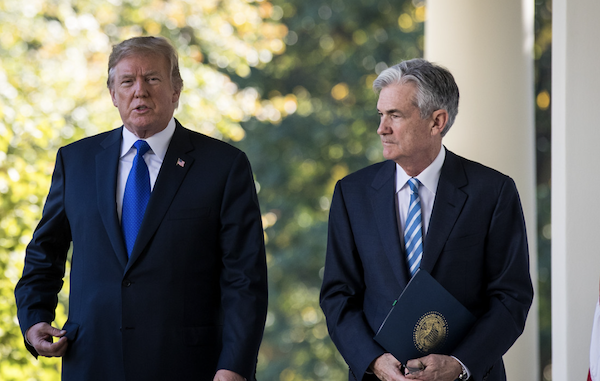Market scorecard
US markets came roaring back yesterday, erasing Monday's losses. That's because Donald Trump said he wouldn't fire Jerome Powell, and Scott Bessent said the trade standoff with China was "unsustainable" so a deal would be forthcoming soon. It's a clown show folks, but at least the news was positive this time.
In company news, Tesla jumped 4.6% and gained another 5.4% after hours as Elon Musk said he'd step back "significantly" from his DOGE government role to refocus on the company. Elsewhere, Intel is planning to cut over 20% of its staff, as new CEO Lip-Bu Tan pushes to streamline operations and revive its engineering edge. Intel shares rose 2% pre-market on the news.
In summary, the JSE All-share was up 0.48%, the S&P 500 rose 2.51%, and the Nasdaq roared 2.71% higher. So volatile. Remarkable.
Our 10c worth
Bright's banter

On Tuesday night, Netflix delivered a blockbuster earnings beat for the first quarter of 2025, posting $10.54 billion in revenue and $6.61 earnings per share, both above expectations. Net profit jumped 24% to $2.89 billion, and margins improved to 31.7%.
The company is firing on all cylinders, with price hikes, growing ad revenue, and steady subscriber momentum. The cheaper ad-supported tier is now 55% of new sign-ups. While Netflix no longer reports subscriber numbers, it hinted at healthy membership growth, especially outside the US.
The ad tier's growth is particularly margin-accretive, as it monetises price-sensitive users while boosting total average revenue per household. Their new in-house ad tech platform launched this month.
The push into live content is going well, with the addition of WWE's Raw and boxing matches. Buzzworthy series like Adolescence and The Residence have also helped deepen engagement across markets.
Netflix reaffirmed full-year revenue guidance of $43.5 to $44.5 billion and expects second-quarter revenue of $11.04 billion. With a goal to double revenue by 2030 and boost global ad sales to $9 billion, Netflix is staying in the lead - and not buffering.
Despite Trump-era tariff jitters weighing on media stocks, Netflix seems immune. Management sees no slowdown and believes in-home entertainment will remain resilient in tough times.
One thing, from Paul

Owning direct stocks in a managed portfolio is a very transparent way to invest. You really see, at a glance, what's working and what's not. For example, you might own Netflix, which is currently at an all-time high and Nike, which is at a multi-year low.
Keeping things simple when investing is a very good idea. Structured products or hedge funds which promise to be "market neutral" usually end up costing you.
Older readers may have heard of Long-Term Capital Management (LTCM), a high-profile hedge fund founded in 1993. Its founder was John Meriwether (pictured here), who had introduced computer modelling at Salomon Brothers. Financial theorists Myron Scholes and Robert Merton joined the team, and both would win Nobel Prizes in economics while at the firm.
Using its computer models, the LTCM's main fund rose by 40% every year in the mid-1990s. They had easy access to debt funding due to lenders' perception that the fund was "low risk".
In 1998, with implied assets of over $100 billion under their control, volatility in the market resulted in LTCM's positions going haywire. Within 5 weeks they had wiped out the whole fund. The Federal Reserve had to step in and bail them out because they had entered into thousands of derivative contracts, so banks and other investors feared a worldwide meltdown.
The LTCM saga gave rise to a book by Roger Lowenstein called When Genius Failed. It's better to own what you can see, and understand.
Michael's musings

Do you remember when the EFF was calling for greater government interference in the operations of the South African Reserve Bank? Do you remember how the Rand weakened?
One of the foundations of the fiat money system is that the central bank needs to be free from political interference because if those in power had their way, they would cut interest rates and print money. In the short run, those actions might stimulate economic growth, but in the longer term, they just lead to inflation and weaker growth.
Historically, political interference has only been an issue for socialist countries or those run by dictators. Why this principle is lost on the White House is beyond me. I suppose it's a continuation from Trump's first term, where he became very critical of Jerome Powell towards the end.
Looking at Powell's record, you would have to say he has done very well. Markets were expecting four interest rate cuts coming into this year, with good economic growth and almost non-existent unemployment. It is very rare to have interest rate cuts during periods of economic growth.
So why hasn't Powell cut interest rates? Well, Trump's new policies are inflationary by nature: tariffs - inflationary; tax cuts - inflationary; deportation of illegal immigrants - inflationary. Regardless of what you think of each policy, they are inflationary, making it harder for interest rates to drop.
It is highly unlikely that Powell will be removed, but the fact that the President is trying to interfere in policy is inappropriate and will lead to the US paying higher interest rates when it wants to borrow money in future.
Linkfest, lap it up
Some movies age like milk. From comedy to action - Their online ratings have continued to decline over time.
Stop saying please and thank you to your AI helper. Sam Altman has a special request - It's wasting millions of dollars in computing power.
Signing off
Asian markets are in the green this morning as investors grow hopeful about progress in tariff talks with India and Japan, and signs of easing trade tensions with China.
In local company news, Aspen Pharmacare rattled investors with an unscheduled announcement that a contractual dispute with an mRNA vaccine manufacturing partner could wipe up to R2 billion off its earnings. More details will follow this morning. Oh dear.
US equity futures are in the green pre-market, which is a relief. The Rand is trading at around R18.60 to the US Dollar.
Have a good day.